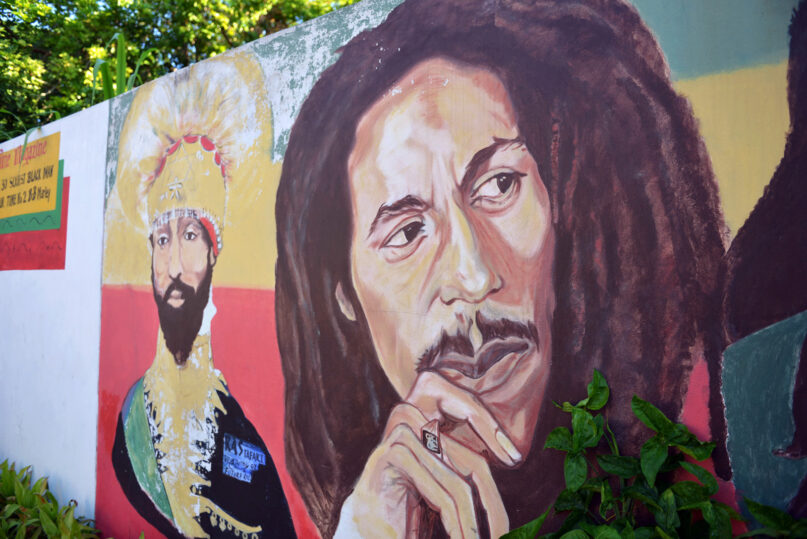(RNS) — The last time I ran into God was at a reggae lounge in Los Angeles.
I was there to see Dancehall legend Sister Nancy — whose 1982 single “Bam Bam” remains one of the most recognizable reggae songs of all time — but my spiritual encounter didn’t occur during her set. Rather, it took place in the hours before she took the stage, as I stood swaying to the obscure dub records being spun by the house DJs, and particularly as the dreadlocked rasta artists from her entourage stepped forward to warm up the crowd.
“In the beginning was the beat … then there was the bass,” an ecstatic Caribbean voice boomed from the echoing speakers, interpolating that familiar creation myth from the Book of Genesis. I stood close enough to feel every kick drum hit in my gut and the vibrations from the bass massage my chest. Flecks of light, reflecting off a disco ball, whirled around the darkened club, as though acting out the voice’s retelling of creation.
It reminded me of the scene from C.S. Lewis’ “The Magician’s Nephew,” in which Aslan sings the world into being, but in this dub retelling, God isn’t a lion but a DJ, and the divine fiat that summons the universe into existence is a reggae melody.
It wasn’t at all surprising to encounter Scripture at the Dub Club LA. Reggae music is deeply spiritual, largely due to its connection to Rastafari, an anti-colonial social movement founded by Jamaican activist and faith healer Leonard Percival Howell.
With the coronation of Ras Tafari Makonnen as Emperor Haile Selassie I of Ethiopia in 1930, Howell began to preach that Selassie had fulfilled Marcus Garvey’s prophecy about a coming Black Messiah. Renowned dub poet Mutabaruka explains: “Rastafari is a Black power movement with a spiritual nucleus.”
Though reggae is not inherently rasta, rastas are overrepresented among the pantheon of reggae artists, because, in its early days, the music quickly became a vehicle for rastas’ messages of liberation and Black consciousness.
Reggae music has always been a part of my life. As a kid I listened to my father, a reggae musician himself, noodle around his guitar as he prepared for shows. In 6th grade, I sat cross-legged in front of my mother’s turntables listening to “I Shot the Sheriff” on repeat. Eventually I decided to fulfill my dad’s dream and make reggae music of my own.
But, since leaving the world of white evangelicalism, where I was told social justice and spirituality are mutually exclusive, reggae music has become a sacred pathway for me to the divine in a way that is new for me.
Today, I feel reggae music in a way I couldn’t before the Black Lives Matter movement. Before the killing of Trayvon Martin, I had succumbed to the routine racial gaslighting of the white world that claims racism is a problem of the past. The white churches I led in worship and preached to echoed that lie by telling me salvation didn’t include liberation from social oppression.
They insisted the good news of Jesus Christ is that we will die and go to heaven. But I wasn’t concerned about heaven. I needed to know if God would intervene against the prison industrial complex.
Bob Marley & The Wailers take white Christianity to task for this dualistic theology. “We sick and tired of your ism schism game, die and go to heaven in Jesus’ name,” he sang in “Get Up, Stand Up!”
Now that I, too, have fully rejected that theology, those words sit with me in a much deeper way. Those lyrics are emblematic of the differences between reggae’s gospel and that of white Christianity. The lyrics evoke the warnings of Hebrew prophets who believed a great Divine reckoning was coming for oppressors.
“Woy! Weh dem a go do when Jah come,” Lila Ike croons over the modernized riddim — the instrumental backing — of Nina Simone’s “Baltimore.”
“Oh! Slave driver, time is catching up on you. Oh! Slave driver! I know your sins dem a haunt you,” Chronixx sings in an almost taunting tone in his song “Capture Land,” before literally singing the story of how Europeans colonized most of the world.
Reggae music takes seriously the notion that God is real and will come to the aid of the oppressed against systemic injustice (also known as “Babylon”). “Reggae music is still here as the voice of the people everywhere, whenever there is injustice and tyranny, reggae music is there,” sang reggae icon Jimmy Cliff in his 2012 song “Reggae Music.”
Reggae music encapsulates the prophetic spirituality I looked to embody when I was an evangelical Christian but could never find. This is why it has become the soundtrack of my own decolonizing journey and spiritual practice, as well as the vehicle for my activism. It’s why the mantra of my life is “It doesn’t have to be this way,” manifested first through my music as a reggae song.
So when I stood on the dance floor of Dub Club LA, I wasn’t just enjoying a nice groove. I was in that moment of spiritual encounter I recognized from the beginning of those church services I used to attend. “Police oppression! Police oppression,” chanted a voice through the speakers — a modern lament. I bowed my head, let it rise and fall with the beat, put my hands on my chest in reverence, as if to say, “Lord, hear our prayer.”
Then, a young artist in sagging pants waddled to the front of the stage with a microphone in his hand, his dreadlocks spilling onto his shoulders from beneath a baseball cap, with one hand in the air. “Jah Jah mek I fi a purpose! So why should I and I be nervous,” he chanted.
I lifted my hands in agreement, gently waving it through the cloud of marijuana smoke overhead, let the red and gold lights drip down my arm. I couldn’t tell if the non-patois-speaking people grinding to the music heard what the prophets were singing, but I cherished that affirmation of divine support after such a heavy lament a few tracks before.
Even in this world of police oppression, if Jah Jah be for me, who can be against me?






